#rules that are fair and equitable
Text
when i was young i used to think about if everyone else in the world disappeared overnight, and how nice it would be, because for me, it meant total freedom. i would never have to follow rules for anyone again, i would never have to perform for anyone again, i would never disappoint anyone's expectations of me ever again
#of course that was just a fantasy and today for better or for worse i am a very strong proponent of having a set of rules and norms#-to follow to ensure the smooth working of society which means that i think people should be able to understand and play by those rules#rules that are fair and equitable#even if it means making personal sacrifices#but... i think that's why i wanted everyone else to disappear#i dont think i can exist in a way that doesn't compromise myself as long as even a single other person exists that i am aware of#though im an introvert i am a social creature to a fault.. i meet people in the middle.. im an aggregate of people i know but not *me*#and i think i really hate that about myself.#yap#moodboard#^ INFJ villain monologue#like id slay as a villain i think. i have the fucked up ideals
7 notes
·
View notes
Text
"Jesus was a communinst!" "Jesus was a socialist!"
*rubs temples*
Guys... Jesus is a divine monarchist.
Any political system that tries to claim him and yet does not put him at its head, as king, is not trying to claim the real Jesus.
#also you are not going to re-achieve eden through human effort#sorry#things aren't ever going to be perfectly fair or equitable or just until He returns to rule as sovereign#RL stuff#Christian#spicy sunday takes to lower the property value of my blog lol#social/commun-ism WISHES it could create a society like the one that is to come#get you a head of state who literally died and descended into hades for you lol
10 notes
·
View notes
Text
ALL ABOUT LIBRA RISINGS

Hey folks! We're back with the next installment of our rising series centering our artsy socialites, Libra!
A review of the ascendant: it is our mask (how we are perceived), our blueprint for life, the indicator of our chart ruler, the purest manifestation of our energy, and our physical body.
PERSONALITY
Libra Risings are ruled by Venus. As opposed to Taurus, Libra is the yang-oriented airy half of Venus. This means Libra has an extroversive quality to it (concerned with external realities and ego expression) and is more detached than Taurus.
Libra energy focuses more on the ideals of love and beauty. This gives Libra both an artistic and intellectual flair. They are oriented towards refinement and social grace. For these Venusians, there is a proper way to communicate (air) in service of connection and harmony (Venus).
Libra intrinsically understands the value of relationships. Being as such, they anticipate the needs of others and weigh things fairly. There is an amazing ability to see all perspectives with Libra.
These are balanced folk who have a charm that often incites conversation and flirtation. They usually know how to maneuver socially, and even if they're a bit awkward, they tend to be respectful of others and well-mannered. Libras hate anything that's unsightly or crude. There's a proper way to be and Libras will remind you of this!
APPEARANCE
And so their presentation is often just as proper. One word we could even use with Libra is...ah...meticulous. In the same way one may obsess over scaling as they try to perfectly measure something. Libras may have a balanced appearance. All hairs are in place, all buttons buttoned. Shoes will match the fit, hair will be kept and neat. They're very much like Virgo, but Libra is often more fashionable. They know how to dress and like to present an elegant, refined, and trendy look to the world. It'll be something that speaks to their innate sense of beauty, the same sense they project onto the world.
WHAT DO YOU SEE, LIBRA?
What needs justice? Who needs help? How can I make things more equitable and fair? How can I refine this? How can I make this more beautiful? Like Pisces there can be cases of rose-colored glasses, but Libra has a more cerebral approach to their environment that separates it from Pisces. An ability to judge and weigh all options equally.

ANGLES IN THE CHART
Libras will have their 4th house ruled by Capricorn, giving a Saturnian edge to their childhood experiences. There was likely always someone to enforce the rules and create boundaries in the home. This likely gave the Libra their sense of authority and lawfulness. The emotional climate of the home could've been cold as Saturn has a frigidity to it. Boundaries and rules are useful, but depending on the astrological personality and whatever the soul contracts are...the Libra's relationship to such restrictions in the home could have been something they rebelled against.
A 10th House in Cancer means Libra Risings will ultimately be seen for their devoted and caring nature. Their careers will likely have something to do with serving other people. Libra Risings have a deep sense of love and justice for the world and do not want to see harm being done to others. Cancer ruling their public life and persona makes sense here, these ascendants want to give their heart to the world. Something about their emotions may be on display as well, Libra Risings could turn to art to express themselves or take the role of some sort of public defender (Cancer is a protective energy).
I also think this may indicate that Libra Risings may go through a couple different careers! I feel as though Moon-ruled houses are subject to a lot of change seeing as the moon shifts constantly.
7th House in Aries...phew...we can take that a couple different directions. Subconsciously, Libra Risings will likely repress their own assertiveness/ego. They will want to keep the peace which may take the form of people-pleasing! Such behavior often builds resentment and denies the person healthy expression of boundaries/ego. These Venusian ascendants than project this onto their partner or seek it out in their relationships. To be a little traditional, this is the compliant housewife seeking an aggressive provider. Or good girl seeking bad boy (to be even more simplistic). It could also simply mean that Libra wants to be in relationships with people who have a healthy sense of self. A lot of Libras are relationship-people, I see this all the time. In this case, I'd say Libra Risings simply want their relationships to remind them of who they are. Their partnerships become a stabilizing force in this way, empowering the Libra to make their own choices and love themselves even harder. Personally, I think that's beautiful.

Libra Risings, ultimately your ability to see and balance all is your power. Your esoteric ruler is Uranus, the planet of innovation and insight. Your mind when applied to the world and your community can help raise the vibrations of love and fairness. Our society benefits from both your romance and your wit. Never change.
-jyeshindra
#astro observations#astrology#horoscope#natal chart#zodiac#astro notes#astrology signs#astro community#ascendant#libra#libra ascendant#libra astrology#libra rising#rising sign#astroblr#astro posts#tropical astrology#natal astrology#astrologer
176 notes
·
View notes
Text
I'm trying to write this post about identity-blind admissions/hiring vs affirmative action and I keep running into the idea that this is mostly just lipstick on a pig; I care about fairness and diversity in the abstract, but equalizing the racial makeup of the US ruling class just isn't a political priority to me.
It's good to try and eliminate the explicit racism in the system, but as long as a racial gap in socioeconomic status exists, a racial gap in ability will as well - between two equally talented student populations, the one with greater access to resources, less proximity to violence, more stability and support, etc will always perform better, even in the absence of explicit discrimination.
Even if you construct a perfectly "fair" system, it will ultimately just replicate the material inequities that exist in the broader society. If you construct an equitable system (ie, one that creates a ruling class that matches the racial distribution of society at large), you still won't have fixed the underlying issues that caused the discrepancy in the first place, and by fiddling with the system, you'll piss off a bunch of other people (in this case, Asian Americans) in the process.
The liberal theory seems to be that if we find the Barack Obamas of the world, who would've been denied admission to elite institutions due to racial discrimination, and elevate them instead, the material problems will work themselves out. But I'm just not convinced this is true - it seems to be operating on a sort of pseudo-ethnonationalism where minorities in power will work to the benefit of "their people" and eventually even things out.
But with the way ruling classes work, it seems like most of the time the ruling class becomes "your people" for new inductees, and everyone else becomes, well, everyone else. Without leaning too hard on a Marxist framework, it seems like the ruling class empirically has a strong sense of class consciousness.
And even when this isn't true, when you encounter people in power who seem to genuinely want to change the world for the better, it's hard to imagine any racial divides being magically healed without some engine of economic redistribution behind it, and this is a task that requires more than just individuals who care about it.
None of which is to say that it makes sense to just throw up your hands and say "society is racist, so I guess it's okay for Harvard to be racist too." By all means, hold their feet to the fire as much as you can. But it's hard for me to write about this without feeling like it's all downstream of the central goal of the leftist project, making a more equitable world.
#politics#not sure if i'm really saying anything interesting here#mostly just throwing shit at the wall and seeing what sticks#long
417 notes
·
View notes
Text
Moon signs compatibility🌙🫧
✨Moon signs that fit together in my opinion. The moon is how you feel and how you take things emotionally.
🌱 Aquarius Moon & Aquarius Moon-They both understand that they need emotional freedom and get caught up in it. Both of them can be goofy together and do crazy things. Otherwise, they can be cold and not so emotional at times, but emotionally they often get along well and they both know how to be alone. They complement each other in many ways.
🫐Sagittarius Moon & Pisces Moon-both are in some way guided by the jupiter. Sagittarius are an independent sign and many times they are more inclined to want to do everything themselves. Pisces are sympathetic and naturally show emotions, so Sagittarius can feel that they can express their emotions. Pisces feel that someone is giving them hope and the positive side of life. Both can be led by spirituality to life. Both can dream together and complement each other through dreams.
🍒Aries Moon& Leo Moon-both signs love to have fun. Aries are an independent sign by themselves, but they could feel more noticed with Leos. Leo needs a lot of attention and Aries could give it to Leo. Both can encourage each other in the things they do and at the same time they are both emotionally independent. Both are able to understand the other on a soulful level, as they can feel the other intuitively. Both together feel that they can express anger or be dramatic and will not feel that they are too much. Both moons love nature and like various activities and would complement each other in this.
🥭 Libra Moon & Gemini Moon-both signs love to talk and are talkative. And both tend to value communication and want to resolve an argument. Difficult situations or problems that arise between them are likely to be dealt with logically and with an attempt to be equitable and fair. Libra gives a lot to the relationship with the person and gemini give a lot to the quality of the relationship. Both know how to thoughtfully find solutions. Both felt heard by each other. Both moons are social and do well in public.
🌊Scorpio Moon & Cancer Moon- will have a wonderful time bonding. Both are water signs. Scorpios are a closed sign, but they can open up with Cancers and feel that they can show their feelings to them. They don't feel like they are emotionally trapped. Both moons feel that they can talk about their feelings and feel understood. Cancers, on the other hand, feel that they can tell their feelings and they will understand them. Scorpio feel like they can trust cancer. Both of them have good intuition.They’ll get super deep, super fast. Nothing can break the commitment they share—in fact, their relationships can last a lifetime.
💧Capricorn Moon & Pisces Moon - Capricorns need someone who is more emotional and gives them sympathy and makes them feel that they are not alone. Pisces need someone to stabilize them. Both can complement each other beautifully emotionally. Capricorns give pisces security and the feeling that they are not being judged. Pisces will help Capricorn open up, while Capricorn will help Pisces learn to be more responsible. Both moons can support each other.
🧸Cancer Moon & Taurus Moon- both value comfort, safety, warmth and emotions. Cancer are often more introverted or want to do things that involve one person. Taurus value time alone with a person and their space. Cancer feel safe with Taurus and their emotions are always stable. Taurus make Cancer feel that they will always be here. They both like to have their own private space and do things like watching movies and eating together. Cancer can draw emotions out of taurus. Taurus appreciate touch, and Cancer feel loved by it. Both could have safe space together.They both love cute things and cute hugs. Both moons know how to show how much they love each other in front of others.
🧼Virgo Moon & Gemini Moon- are ruled by the planet Mercury, which makes them a natural fit. Both somehow need communication and know how to approach the problem that arises. You both enjoy word games, or games that hone and test your knowledge or intellectual skill. Both can complement each other on a mental level. Both know how to be practical and look at things from an objective angle.
🌌Scoprio Moon & Scorpio Moon- both of them will have passionate relationship, and a deep attachment to one another as well. Both of them are deep. Both of you may feel like you can tell each other dark secrets and talk about dark topics without hesitation. Both of you like to keep things hidden and need privacy; you enjoy having secrets. They both understand intensity and can be quite intense together. Both of you crave powerful emotional experiences.
-Rebekah🌊🦋🧸
354 notes
·
View notes
Text

The Golden Era of Pirates
A Liberal and Tolerant Society in Nassau around 1700
The heyday of pirates in Nassau around 1700 was a time of relative peace and prosperity for the island. Pirates established their own laws and rules, fostering a society that valued individuality and tolerated various lifestyles.
A standout principle of this society was the "Golden Rule": "Treat others as you would like to be treated." This maxim emphasized not only fairness but also the importance of respecting individual freedoms. The pirates of Nassau distinguished themselves with exceptional tolerance toward different cultures, religions, and sexual orientations. Their community welcomed people of all origins, regardless of race, religion, or gender.
Diversity within the pirates of Nassau extended to their personal relationships, including same-sex partnerships. Anne Bonny and Mary Read were two of the most renowned female pirates in history, both in a romantic relationship with each other. Edward Teach, also known as Blackbeard, was an English pirate active in the Caribbean and Atlantic, and it is speculated that he was homosexual.
This form of tolerance and openness to diverse lifestyles made the pirates a unique and progressive society.
Further insights into the liberal society of Nassau's pirates are reflected in their laws and institutions:
A court, consisting of a captain and a selected jury, ensured justice.
The system of shared booty guaranteed an equitable distribution of wealth among the crew.
Through democratic elections, the crew determined their captains and officers.
These laws and structures granted pirates control over their own lives. They could not only freely choose their sailing companions but also collectively make decisions about their loot.
There are indications that pirates in Nassau had a form of informal social security for their members, albeit not in the form of modern health insurance or retirement plans.
The system of shared booty, practiced among pirates, can be considered a form of financial security. In successful plundering endeavors, the captured goods or money were evenly distributed among the crew members, allowing pirates, regardless of their rank within the hierarchy, to share in the fruits of their efforts and enjoy some financial security.
Additionally, in case of injuries or illnesses, pirates could claim a share of the loot. This informal support could be viewed as an early form of solidarity and social security.
The pirates of Nassau formed a diverse and tolerant society that granted its members a degree of freedom and self-determination. They stood as an exception to the prevailing norms of their time when most societies were patriarchal and repressive.
#PiratesOfNassau#ToleranceAndDiversity#LiberalSociety#PirateCulture#LGBTQHistory#IndividualFreedom#gayart#gayhistory#queer#LGBT
68 notes
·
View notes
Text
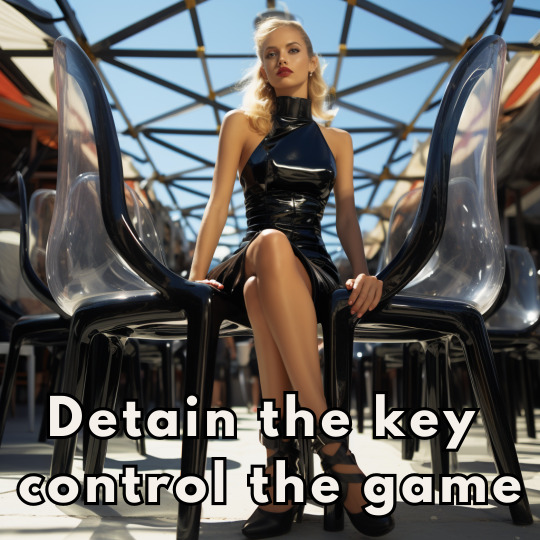
Detain the Key, Control the Game
Exploring the World of Gynarchic Dominant Women
In a world where the traditional norms of power dynamics are being challenged, the rise of gynarchic dominant women is asserting itself with a formidable force. The concept of "Detain the key, control the game" takes center stage in this uncharted territory, where women are embracing their dominance unapologetically and rewriting the rules of the game.
Gynarchy, a social system where women hold the primary positions of power and authority, has become a manifestation of women's empowerment and liberation. These dominant women are not seeking to reverse the tables of oppression but rather to establish a realm where they can exercise their prowess freely. They believe that their rightful place is at the helm, and they are seizing control of the game of life.
The key, a symbol of authority, is firmly grasped by these formidable women. It represents the ability to unlock a new world of opportunities and experiences, not just for themselves but for others as well. Their dominance is not rooted in cruelty or arrogance; rather, it stems from a deep understanding of their capabilities and the desire to lead with compassion, wisdom, and fairness.
Gynarchic dominant women understand that control does not imply suppression; instead, it involves nurturing and guiding those around them to reach their fullest potential. They believe that the true essence of leadership lies in empowering others to become the best versions of themselves.
Society has often perceived dominant women as threats to the established order, but they are, in fact, advocates of positive change. They challenge conventional notions of femininity and masculinity, encouraging individuals to embrace their unique qualities without fear of judgment. These women acknowledge that true strength comes from embracing vulnerability and that true power lies in empathy and understanding.
While gynarchic dominance is sometimes misunderstood, it is essential to recognize that this movement is not about creating a matriarchy to replace patriarchy. Instead, it calls for an inclusive society that acknowledges the value and contributions of all genders. It is about breaking free from the shackles of gender stereotypes and allowing individuals to express themselves authentically.
In this world, men are not emasculated or diminished; instead, they are celebrated for their abilities, accomplishments, and unique attributes. The game is transformed from a competition of power struggles into a cooperative endeavor where everyone's talents are appreciated and utilized for the collective good.
Detaining the key and controlling the game is not an easy task; it requires resilience, determination, and an unwavering belief in one's abilities. These dominant women face challenges and resistance but remain steadfast in their mission to pave the way for a more equitable and inclusive future.
As the gynarchic movement gains momentum, it challenges us all to reconsider our perceptions of power, authority, and gender roles. It asks us to envision a world where the key is not a symbol of control wielded by a select few but a tool used to unlock the vast potential that lies within each of us.
So let us embrace the rise of gynarchic dominant women, for they remind us that leadership knows no gender and that a more compassionate and empathetic world awaits if we are willing to Detain the key and together, control the game.
#gynarchie#matriarchie#femaleledrelationship#gynarchy#matriarchy#femalesupermacy#femaleledworld#keyholder
119 notes
·
View notes
Text
It has been almost two decades in the making, but late on Saturday night in New York, after days of gruelling round-the-clock talks, UN member states finally agreed on a treaty to protect the high seas.
A full day after the deadline for talks had officially passed, the conference president, Rena Lee of Singapore, took to the floor of room 2 of the UN headquarters in New York and announced that the treaty had been agreed. At a later date, the delegates will meet for half a day to formally adopt the text. She made it clear the text would not be reopened.
“In Singapore, we like to go on learning journeys, and this has been the learning journey of a lifetime,” Lee said.
She thanked delegates for their dedication and commitment. “The success is also yours,” she told them.
She received cheers and a standing ovation from delegates in the room who had not left the conference hall for two days and worked through the night in order to get the deal done.

Pictured: The Intergovernmental Conference on Biodiversity Beyond National Jurisdiction congratulating its President, Ambassador Rena Lee, on the successful conclusion of the BBNJ treaty.
The historic treaty is crucial for enforcing the 30x30 pledge made by countries at the UN biodiversity conference in December, to protect a third of the sea (and land) by 2030. Without a treaty, this target would certainly fail, as until now no legal mechanism existed to set up MPAs [Marine Protected Areas] on the high seas.
Ocean ecosystems produce half the oxygen we breathe, represent 95% of the planet’s biosphere and soak up carbon dioxide, as the world’s largest carbon sink. Yet until now, fragmented and loosely enforced rules governing the high seas have rendered this area more susceptible than coastal waters to exploitation.
Veronica Frank, political adviser for Greenpeace, said that while the organisation hadn’t seen the latest text, “We are really happy. The world is so divided and to see multilateralism supported is so important.
“What’s really important is now to use this tool to develop this 30x30 target into force really quickly.” ...

Pictured: Activists from Greenpeace display a banner before the United Nations headquarters during ongoing negotiations at the UN on a treaty to protect the high seas in New York
“High seas marine protected areas can play a critical role in the impacts of climate change,” said Liz Karan, director of Pew’s ocean governance project. “Governments and civil society must now ensure the agreement is adopted and rapidly enters into force and is effectively implemented to safeguard high seas biodiversity.”
The High Ambition Coalition – which includes the EU, US, UK and China – were key players in brokering the deal, building coalitions instead of sowing division and showing willingness to compromise in the final days of talks. The Global South led the way in ensuring the treaty could be put into practice in a fair and equitable way.

Pictured: A world map that shows the full breadth and potential impact of the treat. National waters are shown in white, and international waters, or the high seas, are everything shown in blue.
Michael Imran Kanu, the head of the African Group and ambassador and deputy permanent representative to the UN for legal affairs of Sierra Leone, said the treaty was “robust and ambitious”. Kanu, who expressed concerns during talks over the fair and equitable sharing of benefits, said: “We really achieved amazing results” on this issue. Monetary and non-monetary benefits would be shared and an initial upfront fund would be set up under the treaty. He welcomed the adoption of the “common heritage of humankind” as a key principle for the high seas, which was a red line for many developing states. “That was significant for us”, he said...
In a move seen as an attempt to build trust between rich and poor countries, the European Union pledged €40m ($42m) in New York to facilitate the ratification of the treaty and its early implementation.
Monica Medina, the US assistant secretary for oceans, international environment and scientific affairs, who attended the negotiations in New York, said: “We leave here with the ability to create protected areas in the high seas and achieve the ambitious goal of conserving 30% of the ocean by 2030. And the time to start is now.”
-via The Guardian (US), 3/4/23
#marine protected areas#conservation#oceans#oceanography#international waters#united nations#30 by 30#30x30#biodiversity#climate change#overfishing#good news#hope
139 notes
·
View notes
Text
UPI: "The reason in encouraging the changes to ensure election integrity, the Carter Center siad, is that recent U.S. politics have been "tinged with an aggressive anger and virulent rhetoric that threatens to unravel the fabric of our society."
The guidelines listed are:
Making elections a national priority. The center said the nation's election system is critical to American democracy, so it's critical that "election laws and regulations be guided by principles of fairness that preclude partisanship."
Election laws and should be transparent and simple for the public to understand. One way to ensure the health of the nation's election system, the report's authors say, is to be "fully transparent." Saying that states and localities already have made "great strides" in delivering basic election information to voters, the report's authors say, "this work should continue on all aspects of the process, from registration of voters through certification of election results."
Expand access to voter registration. The center and institute said voter registration rules "should be structured to maximize the likelihood that eligible voters can be added to the rolls without complicated rules or restrictions."
Allow ballot casting to be simple for urban and rural populations. The report's authors said policymakers and election officials "should commit to finding a way to treat voters equitably - eschewing both a 'one size fits all' approach ... in favor of one in which there is "attention to ensuring that voters are not disadvantaged in obtaining or casting a ballot relative to others just because of where they live."
Have technology serve as a boost to voters not an obstacle. Noting that voting machines have become increasingly easier to use, the report's authors urge a design approach that would cover all voting technology, "like electronic poll books and ballot-on-demand printers" so that every step of the election process is accessible and flexible for all voters.
Encourage states and local governments that allow early voting to prioritize counting votes before the election. Saying that offering voting options over several days or weeks makes voting more resilient against potential attacks, the center urged that "communities that allow such ballots should have policies ... that ensure that as many as possible of these ballots (if not all of them) will be returned to election officials in time to be processed and counted as soon as reasonably possible." The center said that, ideally, this should occur before ballots are cast in person.
Make sure oversees voters and military personnel are able to be counted quickly. The center and the institute said states and localities should try to avoid unnecessary restrictions on the use of documents, "like the Federal Postcard Application or the Federal Write-In Absentee Ballot."
Keep the process of vote counting transparent and orderly. "Policymakers and election officials must continue to prioritize accuracy even as they strive to complete counts sooner," the report's authors said.
Conduct regular audits of the election process on the municipal level. The center said election officials should use the most up-to-date and available "techniques and best practices" to validate elections' reliability.
Use recognized best practice standards for elections. The report's authors said states and localities also should be open to having "nonpartisan and independent" election observers.
31 notes
·
View notes
Text
By Alex Rigotti | 18th January 2024
The European Union has called for changes to the music streaming business, including fairer royalty distributions and increasing payments to artists.
On Wednesday (January 17), the EU adopted a resolution to address the imbalance of revenue allocation in music streaming, including creating a new legal framework for streaming. There are currently no EU rules that apply to the sector.
In the resolution, “pre-digital royalty rates” are to be revised, with the EU criticising business models that “force authors to accept lower or no revenues in exchange for greater visibility”.
-> read the full article here on nme.com
In other news, Spotify pulled its services from Uruguay after the country’s copyright law demanded fair pay to artists. (21/11/23)
#good!#let's see if anything happens but it's a start#music news#spotify#nme#18.01.24#21.11.23#article#link
21 notes
·
View notes
Note
What's your take on inheritance taxes as an economist? Good, bad, mixed bag? What behaviour do they incentivise/disincentivise exactly?
It's not a topic I have a super strong take on, or am familiar with the empirical literature, which is always your #1 thing for economics, but I can give some generalized opinions:
Inheritance comes when someone dies and passes on money to relatives. So we'd expect to get less of that. Apart from meme cases of people trying not to die, this means they'll get less value from passing money on at death. This will drive
saving less in life
spending more money in retirement age
passing on money earlier as "gifts"
For the latter, this is part of estate planning. Governments aren't stupid enough not to know, so you get secondary rules of maximum legal gifts to heirs per year while you're alive. So we're already seeing effort going into dodging the tax.
More importantly, or at least less talked about, is that this is earned income which has already been taxed likely multiple times! So someone earns money at their job (income tax), saves it (capital gains taxes), dies and passes it on (estate tax), and then the heir gets it and spends it (sales tax). These have different efficiency levels and distributional effects. Estate probably leans towards "equitable but inefficient" but wide confidence intervals on efficiency. But it's not as if this money hasn't already been taxed, and will be taxed later regardless of estate tax.
My general principles on taxes are that you should hit externalities first (e.g. carbon tax), then highly efficient sources (land/property tax, VAT/sales tax), and try to stay away from things that incentivize savings (capital gains, corporate) or with stupid distortions (tariffs, implicit taxes through fees and fines). Spending can redistribute efficient but flatter taxes through welfare. So I'd feel lukewarm on estate taxes, though at reasonable levels they don't seem like the end of the world.
This is the Numbers Fuckstein viewpoint, though. I expect views on fairness and inequality drive normal peoples' views on estate taxes. I care a lot more about GDP/capita growth, which does trickle down and make things better for working-class people, and savings and productivity growth is the main driver in that.
And if anything in the empirical public finance literature contradicts what I say here, go with that. Tagging @powermonger for input from someone who's better-read.
23 notes
·
View notes
Text
Black Dick and the Spithead Mutiny
Admiral of the Fleet Richard Howe, 1st Earl Howe (1726-1799) was an extraordinary personality and spent more than 60 years in the service of the Royal Navy. On 16 April 1797 the mutiny began at Spithead, the main naval anchorage near Portsmouth.
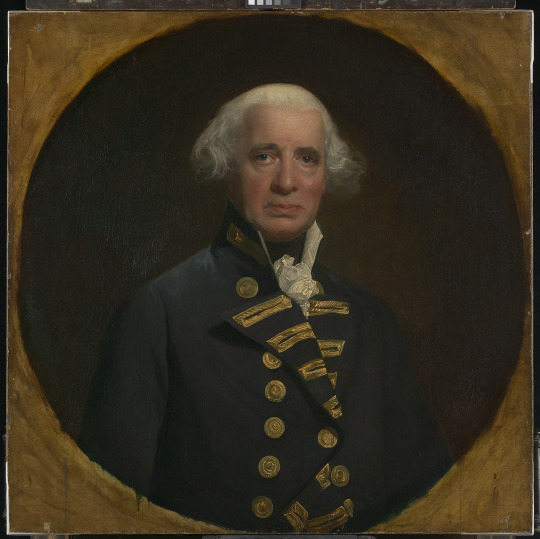
Admiral Richard Howe, 1726-99, 1st Earl Howe, by Henry Singleton (1766–1839) (x)
16 ships of the Channel Fleet raised the red flag of insurrection. The demand of the men: a rais in pay, a more equitable distribution of prize money and better victuals. When negotiations broke down between the two sides, King George III personally requested Howe.
And why him? well, he was one of the few officers who treated men well and was always fair, so he was a stalwart of the men's hearts and was even affectionately known as Black Dick. There have been a number of explanations offered for this, his swarthy complexion also known as " Sea Tan" being one and the fact that he never smiled unless a battle was about to begin may be the other one. But back to the Mutiny. Although over 70 and suffering from gout and other ailments, he agreed - but only if his dear wife Lady Howe accompanied him.
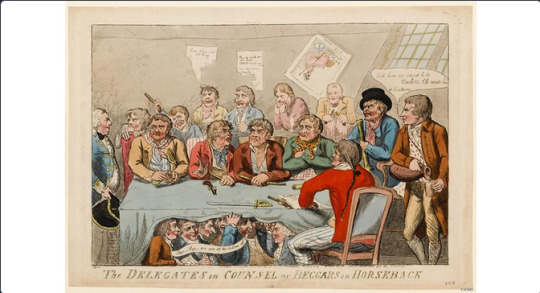
Print of a caricature published 9 June, 1797, depicting the Delegates of the mutiny meeting with Admiral Buckner. Richard Parker is the figure on the far-right. (x)
They set out on 10 May on a wild and stormy night and arrived at Portsmouth the following morning. Howe left his wife at the governor's house and immediately set out by barge for Spithead. He came alongsinde HMS Royal George, the headquarters of the insurrection, and despite his infirmities he rejected all offers to help him come aboard and clambered up unaided. He called the ship's company to the quarterdeck and started to talk to them man to man, neither reproaching their conduct nor standing on his dignity. Several hours later he went to HMS Queen Charlotte. For three days he went from ship to ship - talking, listening, heaving his rheumaticky knees and gouty feet up and down ladders until he was so tired he had to be lifted in and out of his boat. But by the end he has achieved reconciliation on both sides, with a Royal pardon for all the mutineers, a reassignment of some of the most unpopular officers and a pay rise and better victualling for the sailor.
On 15 May there was a grand celebration in Portsmouth, and the mutineers' delegates marched in procession up to the governor's house accompanied by bands playing " God Save the King" and " Rule, Britannia". The delegates were invited inside for refreshments, then appeared on the balcony with the Howes to huzzahs from the multitude, after which they set out together for the anchorage. On board Royal George Howe was given three cheers and the red flag of mutiny was pulled down; the other ships quickly followed. Later that day Lord and Lady Howe hosted a special meal for the delegates before they returned to their ships and reported for duty.
71 notes
·
View notes
Text
Upholding the Rule of Law:
Striving for Equality and Justice
In a just and democratic society, the rule of law stands as the cornerstone of fairness, ensuring that every individual, regardless of their position or power, is subject to the same legal standards. However, recent concerns about disparities in the application of the law have sparked discussions on the need to address any flaws in the system. In this blog post, we will explore the significance of the rule of law and its impact on societal trust, emphasizing the importance of upholding equality and justice for all.
The Rule of Law: An Unwavering Principle
The rule of law is not a mere catchphrase; it is a fundamental principle that underpins the functioning of democratic societies. At its core, the rule of law dictates that the law should be applied uniformly and consistently, without discrimination or favoritism. It ensures that no one, regardless of their status or influence, is above the law, and everyone is held accountable for their actions.
Challenges to the Rule of Law
While the rule of law is a guiding principle, its application can sometimes be influenced by power dynamics, political considerations, or disparities in resources. Such challenges can lead to perceptions that there are "two standards of law"—one for the powerful and privileged and another for the marginalized and less fortunate. When this happens, the very essence of justice is compromised.
The Erosion of Public Trust
When the rule of law appears to be inconsistent or biased, it erodes public trust in the legal system and institutions. Citizens lose faith in their ability to seek justice, and a sense of injustice permeates the collective conscience. This loss of trust can have far-reaching consequences, including decreased civic engagement and an increase in corruption and social unrest.
Addressing Flaws and Ensuring Equality
To maintain the integrity of the rule of law, it is crucial to identify and address any flaws in its application. This involves empowering an independent judiciary that can impartially interpret and enforce laws. Additionally, transparency in legal proceedings is essential to building trust and instilling confidence in the fairness of the system.
Promoting Access to Justice
A key aspect of upholding the rule of law is ensuring that all individuals have equal access to justice. Legal assistance and representation should not be limited to those with resources; rather, it should be accessible to everyone, regardless of their economic background. Equal access to justice enhances the legitimacy of the legal system and safeguards human rights.
Individual Commitment to Justice
Upholding the rule of law requires the commitment of each citizen to stand for justice and fairness. Civic engagement, public awareness, and holding public officials accountable are vital in safeguarding the principles of the rule of law. By advocating for a just and equitable society, individuals can collectively influence positive change.
The rule of law is a powerful concept that ensures a level playing field for all individuals within a democratic society. Striving for equality and justice under the law is an ongoing effort that demands the commitment of both citizens and institutions. By addressing any flaws in the application of the law and promoting transparency, accessibility, and impartiality, we can reinforce the rule of law and create a society where justice prevails for all, regardless of their status or influence. Let us unite in our pursuit of a fair and just world, upholding the principle that no one is above the law.
#RuleOfLaw#Equality#JusticeForAll#UpholdingJustice#Impartiality#Fairness#TrustInLaw#CivicEngagement#AccessToJustice#TransparencyInLaw#LegalSystem#Accountability#HumanRights#Democracy#Inclusivity#SocialJustice#PublicTrust#EqualAccessToJustice#LegalReform#SafeguardingRights
31 notes
·
View notes
Text
Why I think Xavier Thorpe would be in Hufflepuff: part2
Xavier was the only one playing fair in the POE Cup tournament ☺️
Even though he really wanted to win, he did not resort to cheap methods like sabotaging other teams.
Even if there are "no rules" he still wanted to win because of his skills and hard work...
As we can see, Xavier and his team were ahead of the others and they would have won if the others were also playing fair...
Tribute to his Hufflepuff nature that compels him to be just and to give equitable chances to everyone 💛

#wavier#wednesday addams#xavier thorpe#percy hynes white#wednesday and xavier#jenna ortega#wenvier#tim burton#nevermore academy#wednesday#hufflepuff#hogwarts houses#harry potter
15 notes
·
View notes
Note
So, not asking this to be down on Biden or his admin, they have legit done some INCREDIBLE things, but because I know I don't have enough understanding or info to judge for myself. With how much of a threat the current SCOTUS is to... everything, what are the reasons Biden hasn't pushed to expand the number of judges to what it could be based on the precedent of the last time it was expanded and then staffed it with progressives, do you think?
I have written many posts about SCOTUS and SCOTUS expansion, which I can't be arsed to go find right now. In short, it does not require a constitutional amendment to expand the court (which would be impossible since iirc constitutional amendments require 2/3 of the Senate to vote in favor, and you'd have a hard time getting one Republican to vote to expand SCOTUS, let alone 17). In 2021, the Democratic-controlled House Judiciary Committee introduced the Judiciary Act of 2021 to expand SCOTUS (that page explains the rationale and also has a link to the actual text of the legislation, should you be interested in reading it). The plan is to introduce four new justices to expand the court to 13 seats, to match the 13 federal judicial circuits. The last time it was expanded was in 1869, when there were 9 circuits. You can say, uh, that things have changed.
However, obviously, the Republicans have played a long game to hijack and reshape SCOTUS to do exactly what it's now doing, and the last thing they want is anything that makes it more equitable or takes away that automatic and near-absolute power. As far as they are concerned, SCOTUS is now pretty much perfect, and they would howl bloody murder about any attempts to change it, even when McConnell brazenly cheated in plain sight to force Gorsuch and Barrett onto the bench and Kavanaugh's confirmation was also brimful with shady shit. They don't care about fairness, they care about their power, and as you say, SCOTUS in its current incarnation is basically a perfect system for unaccountable right-wing minority autocratic rule, even as the American electorate continues to reject it in actual democratic institutions. So indeed, why hasn't Biden come out more vocally in favor of court reform?
First, as I have said before, SCOTUS reform is still (for better or worse) regarded as political kryptonite for Democrats, especially a student of American politics like Biden. I have mentioned Franklin D. Roosevelt's brief attempt to expand SCOTUS in 1934, to help with getting the New Deal through, but which went down in flames so badly that all of his successors were leery of trying it again. Biden is, as noted, also a fairly orthodox old-school American politician who believes that American institutions can still (mostly) do the job, and is reluctant to drastically reshape them. I do think he's getting there; he started his term full of pointless platitudes about Bipartisanship and Our Republican Friends, whereas his more recent public rhetoric is basically "fuck those guys, we'll do it ourselves if we have to."
I don't agree with his recalcitrance on aggressively pushing for SCOTUS reform, and I think he should take a firmer stand on it. But at the moment, it's pretty much moot. The Republicans are going to take over the House in January, so there goes any chance of starting new legislative efforts in favor of utterly pointless Hunter Biden cosplay investigations. And even with Warnock's seat in the Senate making a 51-49 Democratic majority, there would have to be filibuster reform to ram SCOTUS expansion through (since as I said, not one single Republican would vote for it). With Joe God-King Manchin and Kyrsten The Traitor Sinema still steadfastly refusing to support any filibuster changes, SCOTUS expansion would die the same death as the rest of Biden's thwarted legislative priorities. (Once again, considering the circumstances he is working with, it is ASTONISHING that he has done as much as he has.)
So basically: SCOTUS reform can be achieved with an act of Congress, but in less than a month, Republicans will hold the House and will inflict all their enraging clown nonsense on us. The Democratic Senate majority is still very thin and saddled with the two worst "Democrats" in existence, though we are in fact no longer obliged to pretend that Sinema is a Democrat. For the next two years, what Biden can do is executive orders and confirm judges. He can maybe cut a deal with the House GOP for minor bills here and there, but there's absolutely zero, zip, nada, zilch chance that SCOTUS expansion could go anywhere before 2024 at least.
So should Biden talk about it more obviously and openly? Maybe, especially if SCOTUS inflicts us with more terrible decisions in 2023, as they are almost bound to do. But at the moment, what Biden can actually, practically do about it is very limited, and about to be even more so. So while I wish he would draw attention to it, I also reluctantly understand that there is, at this point, not much use in harping on a problem that cannot be fixed for another two years at the very least. The Democrats in Congress are very, VERY aware of the problem, and they're the ones who, even in a theoretical blue-wave election in 2024, would have to take the initiative in starting it. So that, overall, is probably more important.
54 notes
·
View notes
Text
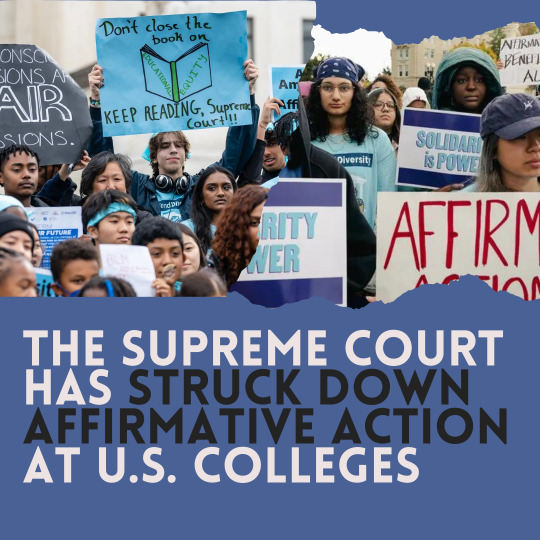
[ID: Square Instagram post. At the top of the post are two photos, edited to appear ripped at the edges, depicting people of varying ages, races, and presentations holding pro-affirmative action signs. Signs feature slogans like “solidarity is power” and “don’t close the book on education and equity, keep reading, Supreme Court.” Below the photos is a dark blue rectangle, also ripped at the edges, with all-caps white and gray text reading “the Supreme Court has struck down affirmative action at U.S colleges.” End ID.]

[ID: A blue square post, with a dark grey, all-caps heading that reads “let’s talk about it.” Below that, smaller white text reads “On June 29, 2023, The U.S. Supreme Court determined that admissions programs at Harvard and the University of North Carolina (UNC) should no longer consider race as a factor in college admissions. While the ruling is based on Harvard and UNC’s policies, the overturning of affirmative action will have wide-reaching, national implications.” at the bottom of the page is a picture, edited to appear ripped at the top edge, which depicts a sign that says “the root of bias in admissions is white supremacy, not affirmative action.” End ID.]
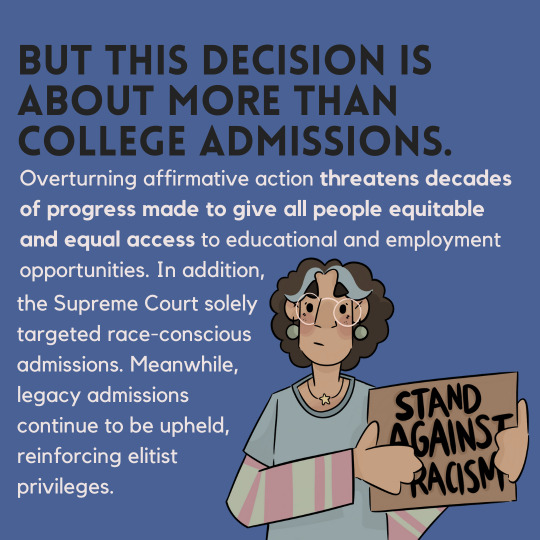
[ID: A blue square post, with a dark gray, all-caps heading that reads “but this decision is about more that college admissions.” Smaller white text below, oriented to the left, reads “Overturning affirmative action threatens decades of progress made to give all people equitable and equal access to educational and employment opportunities. In addition, the Supreme Court solely targeted race-conscious admissions. Meanwhile, legacy admissions continue to be upheld, reinforcing elitist privileges.” In the bottom right corner is an illustrated person with light brown skin and dark curly hair with blue streaks. They have white glasses, and a blue T-shirt over a green and pink striped shirt. They hold a sign that reads “stand against racism.” End ID.]

[ID: A blue square post with a dark all-caps gray heading which reads “affirmative action is equitable action.” Below that, smaller white text reads “This decision does not create fairness in admissions. Removing affirmative action is a strategic tactic to stop the advancement of people of color. As allies, it is necessary to encourage the active participation in intersectional allyship.” In the bottom right, underlined orange text reads “We need to stand against all forms of supremacy, inequity, and discrimination if we are ever to be free.” In the bottom left is an illustrated white person with short circle blue hair. They wear a green and pink shirt with the trans symbol, with a spiked vest over top. They hold a sign that reads “Diversity, Opportunity, Justice.” End ID.]
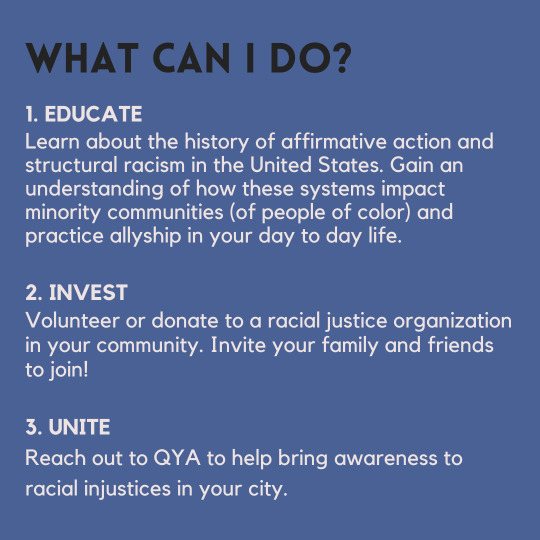
[ID: a blue square post with an all-caps dark gray heading that reads “what can I do?” Below that, smaller white text reads “1. EDUCATE Learn about the history of affirmative action and structural racism in the United States. Gain an understanding of how these systems impact minority communities (of people of color) and practice allyship in your day to day life. 2. INVEST Volunteer or donate to a racial justice organization in your community. Invite your family and friends to join! 3. UNITE Reach out to QYA to help bring awareness to racial injustices in your city. End ID.]

[ID: A blue square post, with an all-caps dark gray heading reading “where can I donate?” Below, smaller white text reads “1. ACLU RACIAL JUSTICE PROGRAM https://www.aclu.org/issues/racial-justice 2. NATIONAL DEI DEFENSE FUND https://race.usc.edu/national-dei-defense-fund/ 3. THURGOOD MARSHALL INSTITUTE https://tminstituteldf.org/ 4. NAACP LEGAL DEFENSE & EDUCATIONAL FUND https://www.naacpldf.org/. End ID.]

[ID: A blue square post with an all caps dark grey heading reading "Sources" Below, smaller white text follows "NPR https://www.npr.org/2023/06/29/1181138066/affirmative-action-supreme-court-decision VOX https://www.vox.com/scotus/23616868/supreme-court-affirmative-action-harvard-unc-students-fair-admissions-john-roberts WASHINGTON POST https://www.washingtonpost.com/politics/2023/06/29/affirmative-action-supreme-court-ruling/ AXIOS https://www.axios.com/2023/06/29/affirmative-action-overturned-students-minorities CNN https://www.axios.com/2023/06/29/affirmative-action-overturned-students-minorities NBC NEWS https://www.nbcnews.com/politics/supreme-court/supreme-court-strikes-affirmative-action-programs-harvard-unc-rcna66770 AP https://apnews.com/article/supreme-court-affirmative-action-college-race-f83d6318017ec9b9029b12ee2256e744 End ID.]
19 notes
·
View notes